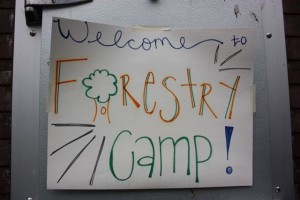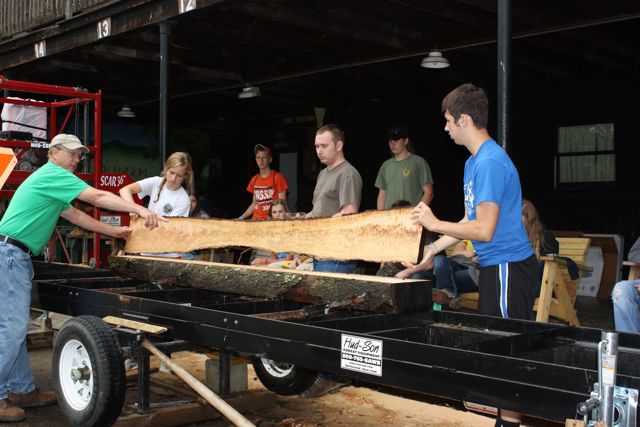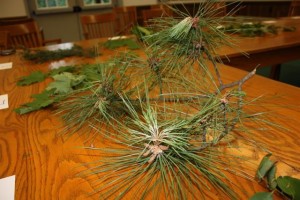CARROLLTON, Ohio — “Loads of fun.”
“Fun, knowledge, friends.”
“Crack your shell.”
“Community, character and opportunity.”
That’s how three campers and a counselor-in-training summed up the Ohio Forestry and Wildlife Conservation Camp in a “three words only” challenge.
Sometimes, a few words can say a lot.
* * *
Twenty-some years ago, Jeremy Scherf bombed his high school biology class leaf collection and ID project.
“I didn’t do very good on it,” he confessed, but his failure triggered his interest (and competitive nature) to learn more, so that summer, he attended the statewide forestry camp.
Today, a state service forester, Scherf is crafting leaf identification tests, teaching natural resource and wildlife sessions, and inspiring youth to explore the great outdoors as co-director of the Ohio Forestry and Wildlife Conservation Camp. (Scroll down to see a video from this year’s camp.)
Last week, June 9-14, 113 campers from across Ohio (one from Pennsylvania, and even one from Arizona) participated in the camp, held at FFA Camp Muskingum, on Leesville Lake in Carroll County.
The camp, sponsored by the Ohio Forestry Association, started in 1950.
Scherf, a service forester with the Ohio Division of Forestry, teamed up with Marne Titchenell, wildlife program specialist with OSU Extension, and Ryan Waid, Cambridge, Ohio-based procurement forester with Glatfelter paper company, to lead this year’s camp.
The goal: Expose the high schoolers to the science, beauty and opportunity within Ohio’s natural resources.
 Too many videogames
Too many videogames
“These days, a lot of kids are overwhelmed with technology and they’re not getting outdoors as often as they should,” Titchenell said. “If nothing else, this camp gives these kids a whole week to spend outdoors learning about the natural environment.”
She first came to camp to teach and was blown away by the quality of the camp and the youth.
“The first year I came here, I was shocked,” she admitted. The campers were a blend of jocks and shy kids and brainiacs and outgoing youth. But the camp classes and team-building exercises broke down any social barriers and cliques, and let the teens connect around the great outdoors.
“These really are the best kids. They just form this bond,” Titchenell said. “They love camp. They just love it.”
See you next year
Many campers will return, like Kevin Jewett, of Butler County. Jewett, now a student at Ball State University studying wildlife biology, came four years as a camper, and served as a counselor-in-training this year.
“I came out here and had the time of my life,” Jewett said, adding that the camp shaped his career goals.
“I had always been interested in science, and had been looking at marine biology and things like that,” he said. “When I came here, the instructors were wonderful and I loved being out in the woods here, and I think that had a big impact.”
Busy week

There are the typical group team-building exercises and social campfires, water games, talent show and dance. But there’s also a thick manual for each camper, and most scribble notes in it from intense sessions on dendrology (the study of trees), tree measurements, songbird identification, stream sampling, ecology, wildlife management, silviculture (dealing with the management and care of forests), forest products and some history of the ancient Ohioans of the forest.
They learn about safety, and non-wood forest products like ginseng and maple syrup. They’re exposed to different logging techniques and equipment; water quality; wildlife diversity and ecosystems.
This year’s returning campers also took a field trip across the lake to a Muskingum Water Conservancy District woodlot marked for a timber harvest.
It’s a STEM education — science, technology, engineering and mathematics — in the real world.
Scholarship reward
The week ends with a test. Yep, an exam.
Each camper takes a test that includes identifying 20 leaf samples and answering 50 multiple choice questions.
The top scorers can earn one of four scholarships: $1,500 to Ohio University; $1,000 or $750 to Ohio State University; or $500 to Hocking College.
Life changing
The week is also perhaps the first time campers are exposed to career options within the natural world. Nearly all of the instructors are current or retired wildlife or forestry experts.
“Some kids want to work outside, but never thought about this as a career,” Scherf said.
“We warn them that they won’t get rich in this field, but they should do it because they love it.”
Ryan Waid, camp co-director and procurement forester with Glatfelter, grew up in the more urban setting of Warren, Ohio. So how did he, a city kid, end up a forester?
“I came to forestry camp,” Waid said.
First-year instructor Dean Sinclair, a wildlife and forestry specialist with the Washington Soil and Water Conservation District, saved some time at the end of his presentation for career questions.
Sinclair told the teens he used to work midnights at a local factory.
“You’re not gonna get rich and you won’t have much time for hunting and fishing,” Sinclair said of his job that often goes beyond the typical 9-5 office hours.
“But I do this because I love the outdoors,” he explained. “Natural resources is a great industry to get into.”
(Story continues below video)
Lots of support
This year’s camp drew 113 teens, up from 77 last year, a trend camp officials hope continues. Camp is open to all high school students, ages 15-18.
Campers can earn scholarships through their county 4-H program, and many county soil and water conservation districts provide scholarships, as do regional forestry associations and garden clubs.
Other individual supporters underwrite camperships, or, as in the case of camper Justin Pasco, of Columbiana County, an uncle encouraged him to go and paid his way.
“I didn’t think it was going to be this fun or exciting or interesting,” Pasco said. “I will definitely come back.”
Get outdoors
Camp organizers know that not every camper will end up a wildlife specialist or a forester, but hope the teens will at least build on the week’s natural resources foundation no matter what their career path.
“They’re just experiencing nature,” Titchenell said, “and to me, that’s the most important thing.
“I hope that they can take that with them.”
























